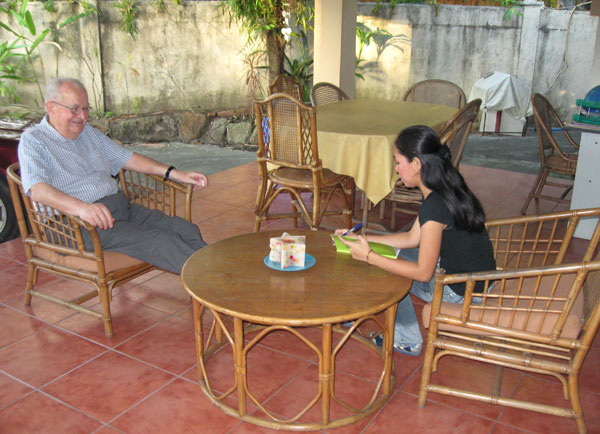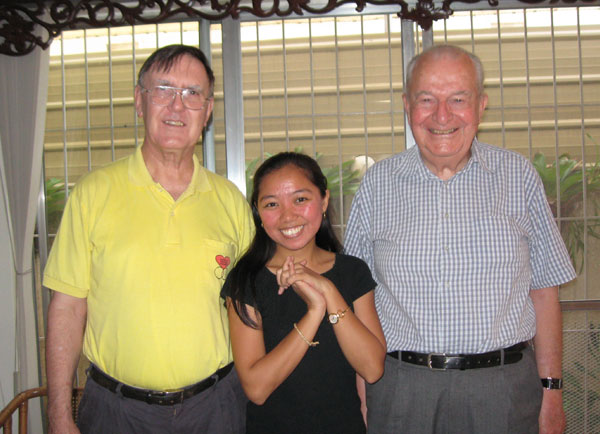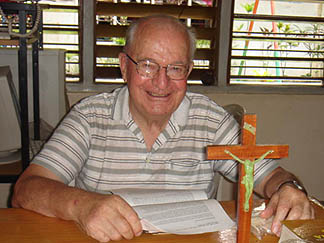An Encounter With Father Mick
By Mary Joy Rile
When I was showing the videos and commentaries of people praying for his release, of the different news and updates we gathered as we followed up on his captivity and release, Fr Michael Sinnott could only smile and nod. Who wouldn't be left speechless by those moving videos of children from Hangop Kabataan, his project in Pagadian City, begging for his release and of children of Holy Family Home, Bacolod City, doing the same, added to the many commentaries of concern posted on our websites! He was amazed at the many affirmations from people, some calling him 'a holy man' and 'a man of peace', and when asked what he could say, he jokingly responded, 'I think I need to go to confession after this.' We laughed but he could not believe those things. His were humbling words that made me admire him more. It appeared to him as if they were talking about a different man. But he also nodded in affirmation when I told him how lucky he is being given the chance to know what people think of him.
I never knew of Fr Michael Sinnott until I learned of his kidnapping. Being part of the Columban family now that I'm working with Misyon, I caught myself being affected by Father Mick's captivity. The daily updates that we were giving on our website made me feel more part of the experience. I felt for the rest of the world in their concern and love for Father Mick.

On 20 November I was privileged to see him at the Columban house in Singalong St, Manila, only at a distance. He was fresh from release then and so busy with many interviews. I was so happy and excited to see him so alive and looking well. I could only wish to stay a little longer. Sadly, I had to rush for my travel. I left Singalong a bit broken hearted for not being given the chance of getting near him, even a handshake. All I could do was long for a much more meaningful encounter with him, as I let go of the thought that I was not meant to talk to him then.
When informed of his coming to Bacolod, I was just controlling my excitement until I had my first touch of him at the airport. It was the encounter that I'd been waiting for!
So the afternoon of his arrival, when Father Seán asked me if I would want to interview him right then, I said, 'sure!' with a very big smile. And without hesitation, Father Mick gave his approval. It was an 'ambush' interview with my unprepared questions but it was for me a fulfilling one as I learned from the wisdom of such a man.

Q: What about your affiliation as a peace advocate?
In the early 1990s, with Bishop Zacharias Jimenez, the Interfaith Forum for Solidarity and Peace was organized in Pagadian. It is a fellowship of the Tri-People: Muslims, Christians and Subanens (Lumads). We have a monthly meeting from 6:30pm-10:00pm. The meeting starts with fellowship - a meal together. Then we start the meeting proper with a prayer and faith sharing. Three to four people share their faith experiences during the past month. Then the meeting proper starts with the reading of the minutes and discussion of social concerns in the Community.
Q: What basically do you do?
We campaign for justice for those who have been killed (eg, especially for the two journalists who were killed) putting pressure on the NBI to investigate. We conduct rallies against drugs and illegal gambling. We issue statements from time to time on issues of social concern. These statements from the Interfaith Group have great influence. Sometimes we ask officials to attend our meeting to discuss problems in the community.
Q: Are you into mediation?
Not really except sometimes people come to us with problems of injustice and we intervene to help them if we find they have a valid case.
Q: You left for Ireland in 1966 but still wishing to come back here to the Philippines. What was then in the Philippines that made you want to come back?
For almost a decade, from 1957 to 1966, I enjoyed working with the people of Mindanao. When I returned in January 1977 I was parish priest in a number of places including Oroquieta City and Aloran in the Archdiocese of Ozamiz and in Dumalinao and San Miguel in the Diocese of Pagadian
Q: What's the best thing being a missionary?
Having established friendships and contacts with Christians, Muslims and Subanens. I have a different outlook on things. It is nice working with people; you have some very good Christians/Muslims, some very bad Christians/Muslims (chuckle!)
Q: What's the most difficult thing being a missionary?
No matter how long you are here, you will never understand the nuances of the culture.
Q: After what happened to you, any plan of going back to Mindanao?
For as long as I can work . . . my heart is there . . . because of the many years I've been here . . . I have already been back in Pagadian for two weeks.
Q: You were so kind to have informed everybody through the media right after your release that your captors were good and kind to you!
They treated me very well. I was comfortable that the people who accompanied me would not harm me. My only worry was that if the military would try to release me by force it would be very difficult to escape unhurt in the small clearances in which we camped.
Q: How were you released?
I think the MILF put pressure on my cap0tors to release me. They told me that due to the intervention of Mr. (Ronaldo) Puno, Secretary of the Department of the Interior and Local Government, blaming the MILF for my captivity, my release was delayed for a week..
The kidnappers called themselves the 'Lost Command'. They were angry with the MILF for saying that it was against the Quoran to kidnap a priest. They said 'it is all right for them because they are getting a lot of money from outside but we have no other way of getting money to buy arms and ammunition except this way'. They made it clear that the kidnapping was for ransom.
Q: How did you feel towards God when you were kidnapped?
At first I was annoyed with the Lord because I found it very hard to pray. I said at least in these circumstances you could give me a sense of devotion and of your closeness. But then I got the conviction that I could safely leave things in his hands and he would take care of me no matter what happened. That is what I did and took each day at a time although there was still dryness in my prayer.
Q: Did you ever think of escaping?
No. There was no way I could find my way out from where we were and besides my captors were fully armed and my chief guard slept in a duyan (hammock) right alongside of me They talked to me in Bisaya (the Cebuano Visayan language) which I understood. But when talking among themselves they used a different language which I did not understand.
Q: I believe it was an opportunity for evangelizing?
They lectured me about their ideologies. They said the Muslims came in 1380 almost two hundred years before the Christians came. When I said that the lumads (tribal people) were here before you, they said 'We are the LUMADS and we converted to Islam. They took our homes and our lands from us and left us to live in poverty. We will fight, and our children will fight, and our children's children will fight until Mindanao is an Independent Islam State with the Quoran for the Constitution and the Religion.'
They said that they would pray to Allah that I would be released quickly and they urged me to pray to my Lord that I be released quickly. Your freedom is also our freedom.
Q: How did you feel when you were released?
It felt very nice to be released, to be free again. I missed the company of people a lot. The days were very long and the nights longer and there was nothing to do all day and there was no communication with the outside world at all. It was nice to get back to the Columban house again.
I was promised that I was going to freedom so many times that I said to myself that I won't believe it any more until I am actually free. So when I was released, I could hardly believe it.
Q: Did you ever think that people were so worried about you?
I felt for Fr Pat O'Donoghue (the Columban superior in the Philippines ) and the bishop (Bishop Emmanuel T. Cabajar CSsR of Pagadian). I knew then that they were worried about me. But I never thought that everybody would learn about my captivity and be so worried about me.
Q: From what happened to you, we saw the value of prayers.
I was amazed to learn when I got out of the coverage the kidnapping got and of the number of people praying for me not only here in the Philippines and in Ireland but all over the world.
Q: We thought that it would widen the gap among the Tri-People but it was actually a way of strengthening the relationship among them.
I learned that a lot of people were really praying for my safe release. And this was not only the Catholics but other Christians and Muslims and Subanens as well. In Pagadian the Catholics said they would say the Divine Mercy prayer for me at 3.00p.m.and the Muslims said they would say 'Azhar Prayer' at 5pm, and the Subanens with their 'Sangat Rituals' at 6pm.
Q: Any opinion as to the MOA-AD (Memorandum of Agreement on Ancestral Domain)? Did it affect the relationship of the Tri-People?
The Muslims were disappointed that the MOA did not push through but the work relations of the Tri-People are good. Even if the MOA-AD was declared unconstitutional, the move is to look for the 'best way forward.' The call for peace-building continues. Mindanao celebrates the Mindanao Week of Peace from end of November into the first week of December.
Q: How do you see the hand of God in that experience?
I was captured, and I did not really know why. God has his own ways and picks peculiar instruments sometimes to achieve his purposes.
Q: Do you feel favored?
I never had any traumas. Didn't have any sickness. Your prayers were really effective…
Q: Any message?
Thanks to everybody, to those who prayed and helped for my release . . . It's very difficult to find words to adequately express my gratitude to them all . . .
I truly felt so privileged to be granted an interview with Fr Michael Sinnott, more so, blessed by such a holy man. He has this aura that's undeniably holy. It exudes such goodness that you would wish yourself to be infected. His silence speaks so much of his simplicity, humility, and peacefulness. He generously gave me a hug after the interview.
Father Mick was the man we'd been praying for. What he had was never his alone but for the world to realize the true existence of God. It brought the world, of different religions, to its knees. He was God's instrument to teach us to pray in faith as a community, as a nation, as a world, once again. It proved to our hearts that hope never leaves as long as we hold on to our faith.
May God, the Creator, bless us that we may all learn to live in peace in co-existence with people of different cultures, of different religions, and in harmony with nature.
You may contact Joy at editorialassistant@misyononline.com